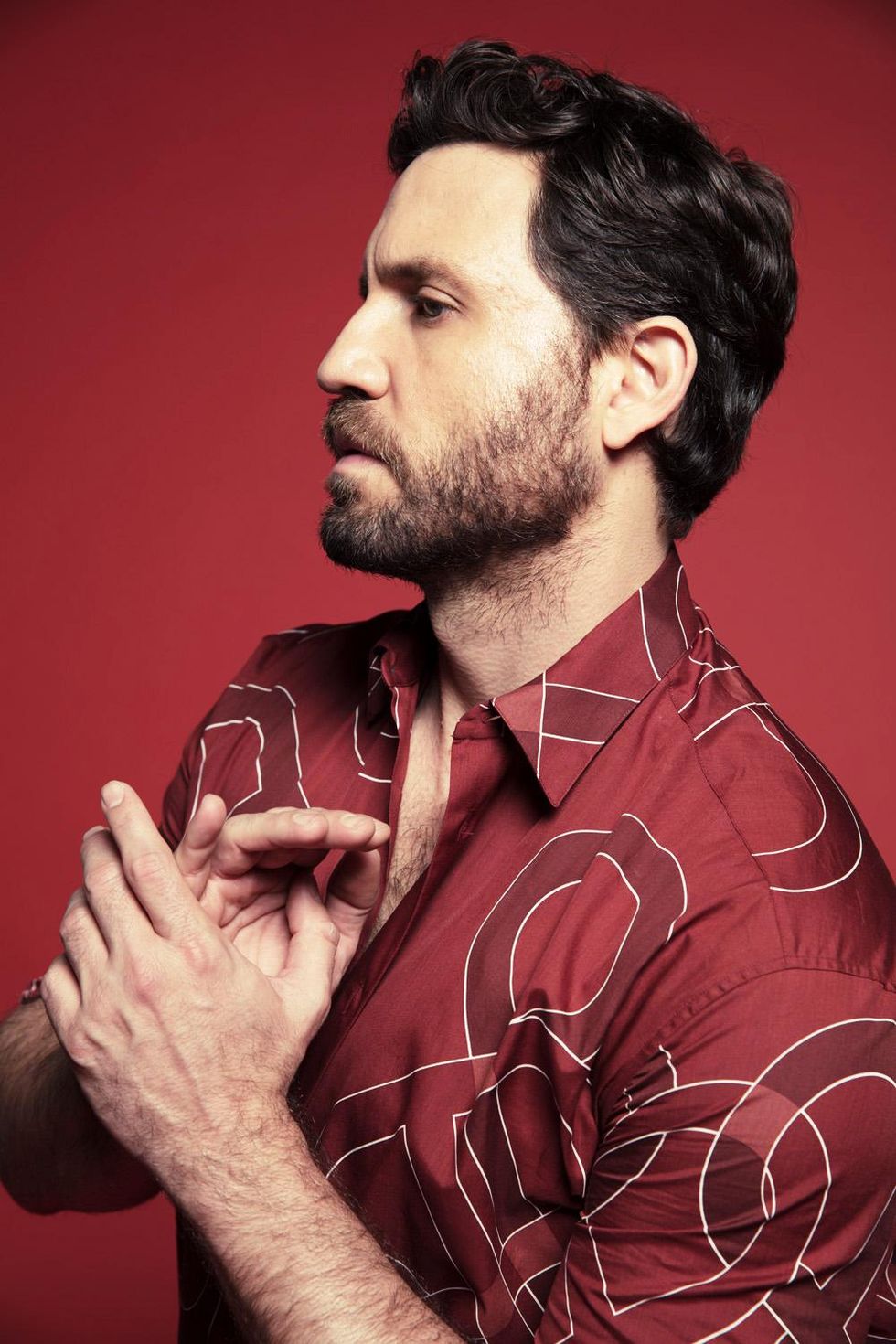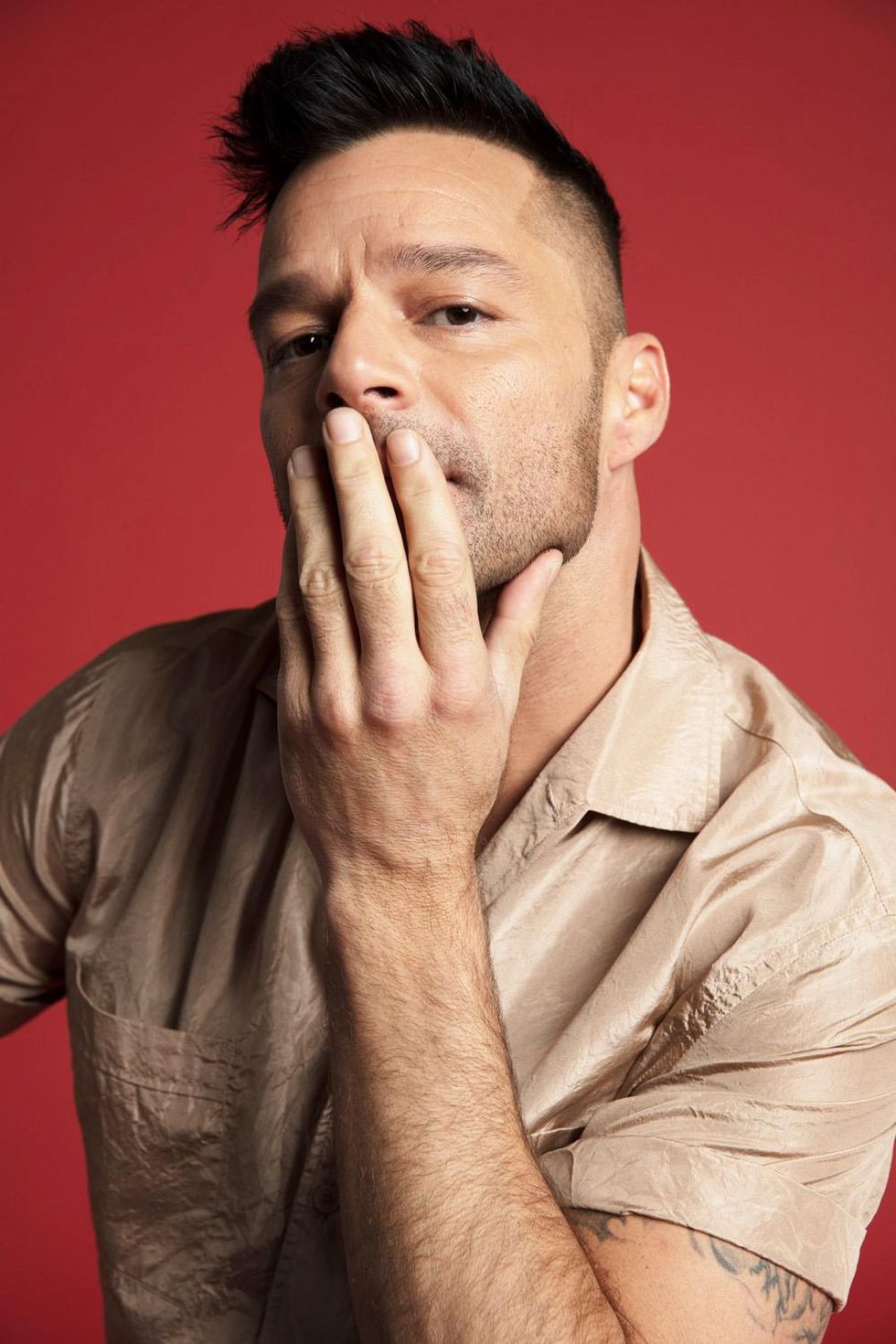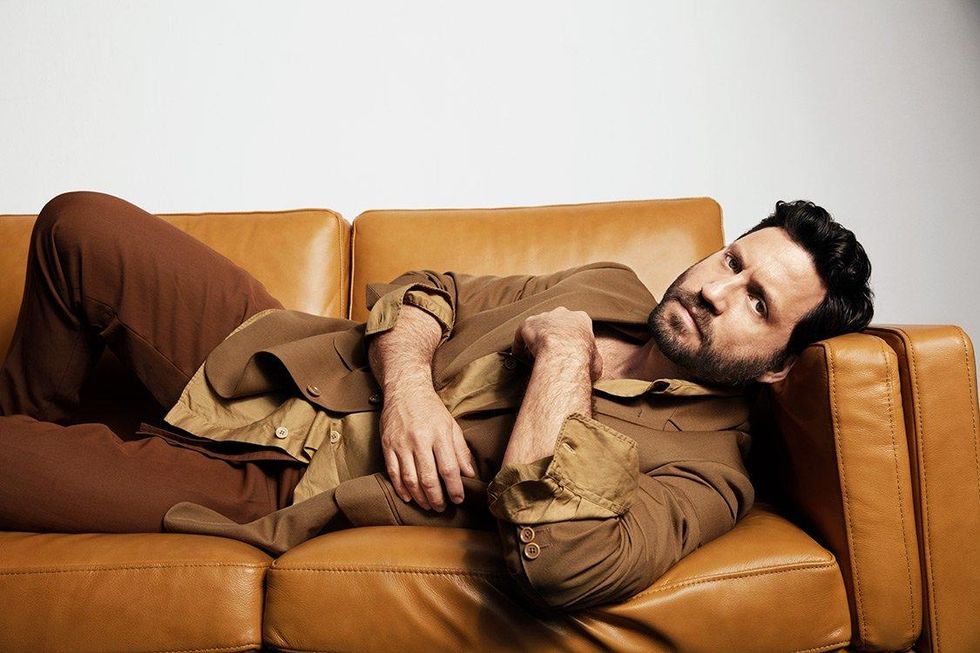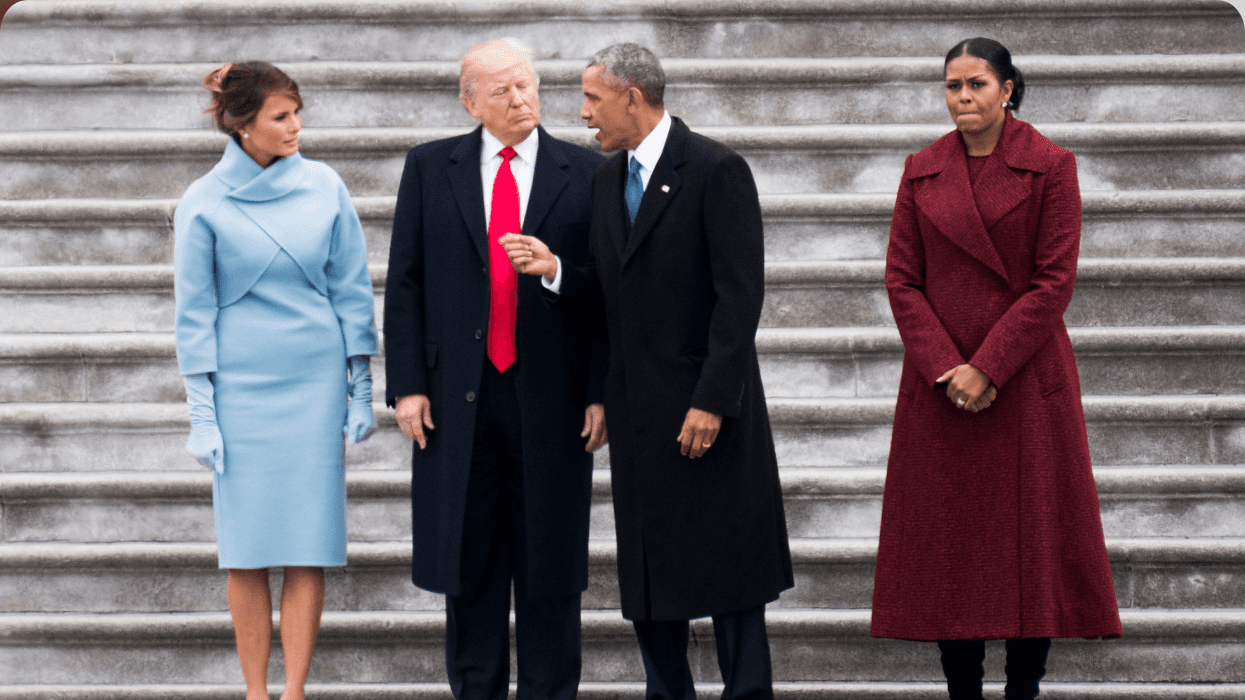For months during the filming of American Crime Story, Ricky Martin found himself back in the closet--this time playing Antonio D'Amico, the longtime lover of the late Gianni Versace. In the pilot episode of the FX series, a detective with the Miami Police Department interrogates D'Amico after the designer is murdered. Unsure what D'Amico means when he refers to Versace as his "partner," he questions the nature of their relationship, invoking the young men D'Amico would procure for him, some of them duly compensated, and asking, "Did he pay you?"
"To love him?" responds D'Amico, still covered in the blood of his boyfriend of 15 years, though he seems more wounded by the detective's callous assertion--the idea that two men could ever be in a committed relationship is completely foreign to him. Yet the moment illustrates one of the overarching themes of the second installment of American Crime Story, based on Maureen Orth's 1999 book Vulgar Favors, and adapted by British author Tom Rob Smith. Just as The People v. OJ Simpson before it offered an all-too-timely commentary on racism, The Assassination of Gianni Versace promises to tackle issues like homophobia, gun violence, and the dark allure of fame.
Related | Gallery: American Crime Story Stars Ricky Martin and Edgar Ramirez
"I believe that the story of injustice this series will bring to the table will spark a lot of conversations about things that we, as the LGBTQ community, were dealing with in the '90s, and that we're still dealing with," says Martin, though he shies away from revealing too many details about The Assassination. "At this point in our lives, there shouldn't be stigmas over the things that we are going to be talking about."
The show, another jewel in showrunner and creator Ryan Murphy's television crown, will examine the lives of two gay men and their radically different paths: Gianni Versace (played by Edgar Ramirez)--the Italian designer who injected the world of fashion with a wild dose of ostentation, sensuality, and celebrity glamour--and Andrew Cunanan (Glee's Darren Criss), the 27-year-old Versace fanboy who left a trail of death and devastation in his quest for fame, ultimately finding it, and landing on the FBI's Ten Most Wanted list, by murdering the man he so idolized.
Cunanan was born in National City, Calif., on August 31, 1969, to a mostly absent, class-conscious Filipino-American father and a deeply religious Italian-American mother. He was a brilliant child with a reported IQ of 147. Growing up in a strict Catholic household, he struggled with his sexuality from a young age, so that later in life he was open to some, but closeted to others. He also had a reputation for being a pathological liar. After dropping out of the University of California, San Diego, he tried his hand at hustling, drug dealing, and petty robbery--anything to avoid a traditional nine-to-five. He charmed his way into a meeting with Versace on the evening of October 21, 1990, in San Francisco. Versace had designed the costumes for Richard Strauss's opera Capriccio and was in town for the premiere. It was a brief encounter--Orth dedicates just three pages to it in Vulgar Favors--but for Cunanan, it was significant. Versace was the only celebrity he claimed to know with whom he had any ties, no matter how tenuous. According to Orth, when the FBI asked Philip Merrill, a friend of Cunanan's, where the wanted murderer would go and whom he would try to contact, Merrill said: Florida and Versace.
By the time Cunanan gunned down the 50-year-old designer on the steps of his palatial estate, Casa Casuarina at 1116 Ocean Drive in South Beach, Miami, on the morning of July 15, 1997, he had already killed four men, including Jeff Trail, a 28-year-old Navy veteran, and David Madson, a 33-year-old architect, three months earlier in Minneapolis--both men were gay and at least one of them, Madson, was a former lover. But the nation didn't take any real notice until Cunanan had traversed thousands of miles over several months. By then, Versace was dead.
"The whole city of Miami was in shock and never recovered," says Martin, who was living in Miami but touring Europe at the time of Versace's death. "Obviously what was happening in fashion was massive, but there was also what was happening in the film industry, with all these great actors moving to Miami because it was the Riviera of the United States. After Versace's death, everything stuck because everybody was afraid. It has taken many, many, many years for Miami to return to where it was and maybe it will never be the same."
On July 7, eight days before Versace's murder, Cunanan visited the Cash on the Beach pawn shop to sell a gold coin he had stolen from his third victim, Lee Miglin, a 72-year-old married real estate developer he had killed and tortured on May 4 in Chicago, which eventually led to the FBI adding Cunanan to its infamous fugitives list. As required by the pawn shop, the serial killer had signed his name--his real name--and had even given the address where he was staying. Vivian Olivia, the owner of Cash on the Beach, turned over the identifying paperwork to the Miami Police the following day, yet no action was taken. Meanwhile, the red pickup truck of William Reese, the 45-year-old caretaker Cunanan had murdered in Pennsville, N.J., just days after Miglin, sat in a parking garage for weeks. The FBI, insistent that Cunanan's sexual orientation was irrelevant to their investigation, refused to distribute Most Wanted posters of Cunanan or to work with local gay organizations and publications.
"For a number of reasons, the authorities at the time never considered Cunanan to be a public threat because he was only killing homosexuals," says Ramirez, the Venezuelan actor whose startling resemblance to the late designer helped secure him the title role in ACS. "The word assassination has a political and a social overtone because Versace was targeted. In a way, this was a tragedy that could have been prevented. Basically, homophobia killed Gianni Versace."
Shirt by Hermes. (Photography: Doug Inglish)
Giovanni Maria Versace was born in Reggio Calabria, Italy, on December 2, 1946. The region's Hellenic heritage--it had been part of Magna Graecia (Latin for "Great Greece"), the coastal areas of Southern Italy populated by Greek settlers--had a lasting influence on Versace and his work, most notably in the Medusa head and Greek keys of the label's logo. His mother ran a dressmaking business, so fashion was a part of young Gianni's DNA. He briefly went to work for his mother after graduating high school but fled the nest for Milan in 1972, bringing his formidable talents to the Italian ateliers Genny, Complice, and Callaghan. With his older brother Santo and younger sister Donatella, he launched his own company, and in 1978 debuted his first collection.
Throughout the '80s and '90s, Versace elevated sexy to an art form. As the adage, at times attributed to Anna Wintour, goes: Armani dressed the wife and Versace dressed the mistress. His looks were brash, bold, and sometimes delightfully tacky, rendered in luminescent metallics, sadomasochistic rubbers, and industrialized plastics that pushed the boundaries of fashion and "good taste." More than any other designer, before him or since, Versace permeated then all but defined the zeitgeist: from Elizabeth Hurley's iconic safety-pin black dress (recently reappropriated by Lady Gaga), to Elizabeth Berkley's doe-eyed infatuation with "Versayce" in 1995's Showgirls, to rap group Migos's 2013 breakthrough hit "Versace."
Versace's South Beach mansion was a monument to his grandeur, outfitted in Grecian opulence. Built in 1930 by trust-fund playboy and retired architect Alden Freeman, Casa Casuarina is now a hotel and popular tourist destination. Versace was enamored by the house's Kneeling Aphrodite statue and bought the property for $2.95 million and the old Art Deco Hotel Revere next door for $3.7 million, which he promptly demolished, angering the Miami Design Preservation League--the neighborhood had been on the National Register of Historic Places since 1979. Versace invested an additional $32 million in renovations to realize his palace, decorating every inch with his exacting eye. In the opening minutes of The Assassination, Ramirez, in a resplendent pink robe, greets his army of servants with a measure of benevolence and unquestioned authority. The effect is that of an emperor surveying his mighty kingdom. From there, the series plays up the Greek-like tragedy of Versace's life and death.
"His life was fated in a way," says Ramirez. "There is something very classic about this real-life story that was captured by Tom: the characters, the archetypes, their relationships. You have Gianni as an emperor, and then you have his prince, Antonio, and you have his sister, Donatella, who is the empress-to-be. Sometimes there were scenes that really felt like we were doing theater, like Macbeth or Madea."
Versace used his majestic property to entertain, and occasionally shelter, his circle of VIPs. In awe of the power of celebrity, he cultivated a loyal, glitzy following that included Princess Diana, Elton John, Madonna, Cher, and the supermodels he regularly employed, and in whose rise he was instrumental: Naomi, Cindy, Linda, Claudia. These famous clients and friends populated his front rows, appeared in his ad campaigns, and frequented his homes around the world. And his ambition wasn't limited to the runway--Versace expanded his empire, designing costumes for operas, films, ballets, and concert tours.
"We basically live in the world that he created," Ramirez says. "Before Gianni, glamour and sensuality were on two separate planes. Somehow he glamorized sexuality. He had a rock 'n' roll approach to couture, and he essentially laid the ground for celebrity culture. From then on, for better and for worse, we've had this obsession with it. The sociopath who killed him was seduced by fame and by luxury."
Versace was also one of the few openly gay celebrities of his day, having been with D'Amico, a former model, since 1982. Though, according to Martin, there was a limit to their openness.
"For many months in this series, I kind of went back into the closet," the 46-year-old says. "They were not completely out. The fear of being seen holding hands in the streets is not an issue for me anymore, but I relived all of that, and it kinda set me back and gave me a lot of discomfort. But I was playing a part, and I used it. I used that anger and I used that frustration."
The Assassination of Gianni Versace is the gayest thing FX or Ryan Murphy has ever done. And for anyone who's seen Popular, or Glee, or the last few seasons of Nip/Tuck, or the musical number in American Horror Story: Asylum, that's saying a lot. But it's also a profound statement. Murphy, an openly gay showrunner and one of the most powerful and successful visionaries in Hollywood, has produced a series about an openly gay fashion designer (who was killed by a gay serial killer), featuring an openly gay pop star playing his boyfriend. Martin, who came out publicly in 2010, hadn't even considered this level of out-and-proudness, but he's acutely aware of how the show's themes resonate in today's terrifying political climate.
Shirt by Bottega Veneta. (Photography: Doug Inglish)
Ricky Martin has been in the public eye for the majority of his life--first in the popular boy band Menudo, which he parlayed into a successful music career in Latin America and a featured role on the long-running soap opera General Hospital. But it was a 1999 Grammy performance of "The Cup of Life," the official song of the previous year's World Cup, and the subsequent release of his U.S. breakthrough single, "Livin' La Vida Loca," that skyrocketed him to superstardom and ushered in the so-called "Latin explosion."
With increased exposure, however, came increased scrutiny, and for years rumors regarding his sexual orientation persisted. Male pop stars have rarely been allowed to be openly gay, and those that were, like Elton John and George Michael, waited until relatively late in their careers to come out. For Martin, consequently, The Assassination of Gianni Versace offered a unique and personal challenge because, to paraphrase executive producer Brad Simpson, it's about the politics of being out in the '90s. Today, Martin is much more comfortable in his own skin. Not only is he in love (he's been in a relationship with Syrian-Swedish painter Jwan Yosef since 2015), but he's a father of two--and adamant that his family be an inspiration for other nontraditional families.
"A lot of people tell me, 'Well, your kids are on the covers of magazines and blah, blah, blah,' and I'm like, 'Yes because I want to normalize this,' " he says. "I want people to look at me and see a family and say, 'There's nothing wrong with that.' It's part of my mission. It's part of my kids' mission as well. My kids ask me about having two daddies and I tell them we are a part of a modern family. This is a beautiful sense of freedom."
By taking on the role of Antonio D'Amico, the singer-actor had to conjure those years of hiding who he was, but in doing so he knew he was paying tribute to the love that Versace and D'Amico shared. Martin's first day on set and his very first scene were also his most dramatic. "They didn't even let me warm up--I went straight into the murder," he says. "I went straight into the moment where I find the body on the steps of the villa outside. It was a really long day. I was locked in this room for many hours just to be there in the moment when I looked out the window and saw Edgar's feet. I went crazy and said, 'Let's shoot now! Please let's shoot now!' "
After seeing production shots of Martin cradling a bloody Ramirez, D'Amico derided the tableau as "ridiculous" and a product of the "director's poetic license." In an interview with The Guardian last July, he also contradicted Martin's assertion that he and Versace ever had to conceal their love. Martin then reached out to the 59-year-old D'Amico, whom he says was "incredibly generous" and "really honest."
"The first thing I said to him was, 'Antonio, I just want you to know that we all are working on this story with the utmost respect to what Gianni Versace represents to the world, and then we go to love," says Martin. " 'My role here is for people to understand you, and see what the love you guys had was made of.' They were together for 15 years. It's a lifetime. And like Antonio says, there was no end to this love. There is no end to this love."
"There are two love stories," Ramirez adds. "One with Antonio, Ricky's character, and the other with Penelope Cruz's character, Donatella. Gianni was very devoted to both of them. Ricky and I wanted to be respectful of their relationship and open about how supportive they were of each other. According to everyone I talked to, Gianni was very protective of Antonio, and Antonio was very protective of Gianni."
There is, however, no love lost between D'Amico and Donatella Versace. The two always had a contentious relationship. In his will, Versace provided D'Amico with a $30,000-a-month lifetime allowance and the right to live in any of the late designer's homes, but because of a feud with the Versace family, D'Amico received a portion of what he was owed.
Family was of the utmost importance to Gianni Versace, but his own didn't want to be involved in the show's production. Ramirez, no stranger to playing biographical characters--he earned an Emmy nomination in 2011 for his portrayal of Venezuelan revolutionary Ilich Ramirez Sanchez in Carlos--approached the series with immense compassion, but out of respect (and for legal reasons) he chose not to approach the designer's surviving family members.
"Whatever hesitations or reservations they have about the series, I understand," Ramirez says of the Versace family. "This is a tragedy. It should have never happened. We want to enforce our own empathy. I hope that in the end they will be satisfied."
Jacket and shirt by Dries Van Noten. Pants by Salvatore Ferragamo. (Photography: Doug Inglish)
What is a historical or cultural moment for the rest of the world is a story of intense personal tragedy for the family and former partner of Gianni Versace, so a production of this scale and caliber--this isn't, after all, the Gina Gershon Lifetime movie House of Versace--is bound to reopen old wounds and draw renewed scrutiny. And yet: That's fame. One's life--and death--are no longer one's own. But what made The People v. OJ Simpson so successful was how it took a tragedy and articulated its significance to the world we live in: a world with a 24/7 news cycle, a world of continued racial animus, a world of keeping up with the Kardashians.
While LGBTQ people have more rights and freedoms than in any other time in U.S. history, the rapid progress of marginalized communities over the previous years has revealed the cracks in this country--ugly truths barely hidden just below the surface have been exposed. This America abets white supremacists, bolsters an accused pedophile who believes homosexuality should be illegal, and neglects the victims of a mishandled natural disaster because they're not quite "American" enough.
"We've been taking four airplanes with 150,000 pounds' worth of basic necessities," Martin says of the relief effort in Puerto Rico, of which he's been a part. "It's been very difficult because four million US citizens are still without power or clean drinking water. My family is there and luckily, I can bring them out to take a break, but there's a very intense passion about where we come from, and they don't want to leave."
And, of course, it's impossible to deny that if homophobia killed Gianni Versace, so did a gun. On June 12, 2016, Omar Mateen opened fire at the Pulse nightclub in Orlando, Fl., killing 49 people and wounding 58 others. The overwhelming majority of his victims were queer people of color in what was, until 15 months later, the deadliest mass shooting on American soil. "I want to be very respectful about this because I am not American," Ramirez begins, cautiously. "But I have a very hard time reconciling how easy it is to gain access to guns here. And I come from one of the most violent countries in the world."
Though mass shootings remain a uniquely American phenomenon, the conversations around gun control and mental illness have ultimately gone nowhere. For 35 years, the United States has rarely gone a year without a mass shooting. In 1997, the year of Andrew Cunanan's murderous spree, more than 32,000 people were killed by guns. That number has remained stable, so that on any given day, 93 people are shot to death.
After Versace was killed, speculation ran wild regarding Cunanan's motive. Some claimed an HIV-positive diagnosis triggered his murderous streak, but an autopsy debunked that theory, itself a form of homophobia. In 1997, homosexuality and AIDS were still inextricably bound so that a gay serial killer was automatically linked to the disease--as if Gregg Araki's The Living End had come to life. But whereas that 1992 film glamorized its killers, the Andrew Cunanan in The Assassination of Gianni Versace is a pitiable figure--a lost soul grasping at a fantasy embodied by his final and most famous victim. Cunanan, too, was a victim--of homophobia, both internalized and externalized; of his own desires; of his upbringing; of the world in which he lived. Through his detestable actions, he finally got what he wanted: It's now impossible to discuss the legacy of fashion's one-time emperor without also remembering the man who cut his life short that July morning.
Photographed by Doug Inglish.
Market Editor: Michael Cook.
Styling: Grant Woolhead.
Groomer: Barbara Guillaume at Forward Artist.
































I watched the Kid Rock Turning Point USA halftime show so you don't have to
Opinion: "I have no problem with lip syncing, but you'd think the side that hates drag queens so much would have a little more shame about it," writes Ryan Adamczeski.